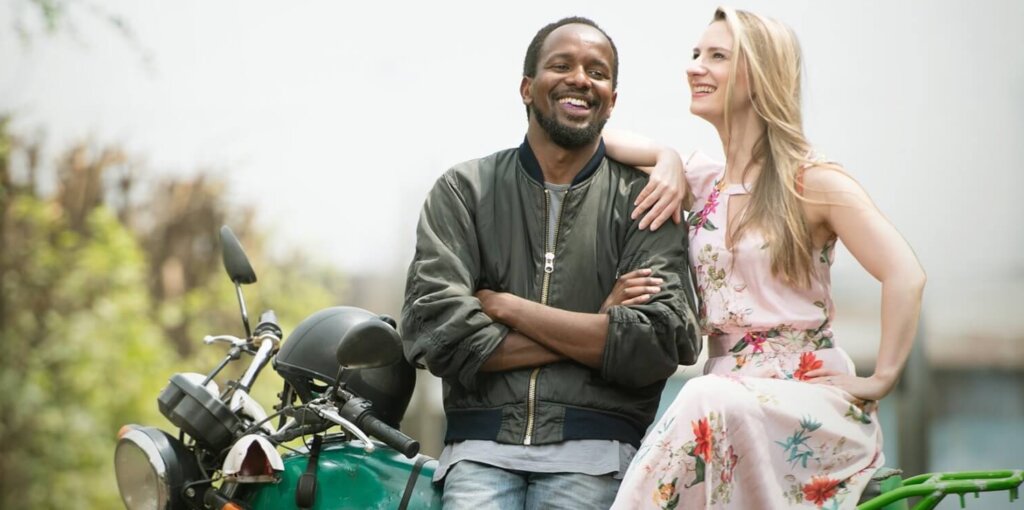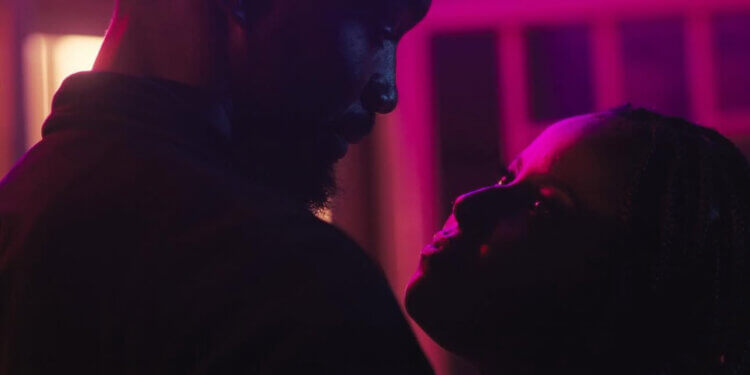Kenya’s latest romantic comedy Sayari, released this April, follows a mixed‑class relationship between Shiru (Muhugu Theuri) and Jamal (Lucarelli Onyango).
Director Omar Hamza knows the genre well, packing in the essentials: a meet‑cute, an enemies‑to‑lovers arc, the inevitable squabbles, a painful break, and the grand gesture. It’s tight, layered, and deceptively simple.
But what is the film actually trying to say about love on the African continent?
At its heart, Sayari is unapologetically Shakespearean. Jamal is a runaway groom from a wealthy family that owns an SME in Nairobi — complete with the swanky, TV‑style offices that recall the heyday of Mali and other 2010s Kenyan family dramas. In an early scene, he declares he’ll only marry someone who makes his heart flutter. His father (played by Eddy Kimani) immediately dismisses this, insisting marriage is, above all, an economic proposition.
Shiru ironically agrees with Jamal’s father on most things in their few, measured interactions — and yet she falls for Jamal. Because he just brings out the best in her. At its strongest, the film explores life’s dissonances, using contemporary Kenyan culture to ground its themes.
All of this made me wonder: what are African filmmakers telling us about love when we place Sayari within the broader romantic canon?
Zooming out, one of the recurring tropes in Kenyan romantic films like Rafiki, Sayari, and Boda Love is the veteran actor in a grounding parental role. We’ve already mentioned Eddy Kimani in Sayari. Rafiki featured Jimmy Gathu as a supportive father and Muthoni Gathecha as the familiar villain — a role she could clearly do in her sleep. Gathecha later flipped the script in Boda Love, playing against type as a nurturing matriarch.
It’s not the most original device — Shakespeare’s evolution into contemporary adaptations such as The Lion King and Succession gave us Mufasa and Logan Roy, towering authority figures whose presence shapes everything around them. In African films, these authority figures are closer to Romeo and Juliet in what they represent. As Will Smith once said, the parents just don’t understand them — not how they think, not how they love.
African filmmakers are, however, adding their own cultural spin by mining taboos like homosexuality in Rafiki, for instance. And while Sayari takes a baby step toward subverting expectations, perhaps it’s time we pushed that trope even further. Maybe develop the parents more — give them interior lives and distinct motives. If they’re so vital to the genre, perhaps they deserve a more personal reason to oppose the union. Or perhaps remove them altogether and let the audience decide whether they’re truly necessary in this kind of story.
In recent years, the continent has been taking stock—trying to understand exactly how we love. At first glance, that might seem frivolous. Love is deeply personal, best expressed and experienced individually. You’d think there’s no universal experience of it and, therefore, little depth to analyze. But that assumption overlooks the vast terrain of African storytelling.
In literature, depictions of love are expansive: from fiction about love in colonial Central Kenya to anthropological studies on sex in postcolonial Nairobi, and everything in between. Film, on the other hand—more expensive and labor-intensive to produce—tends to arrive less frequently. When it does, we cherish it. And perhaps filmmakers feel an even greater responsibility to make each one count.
Take Boda Love (2024) , for instance. The film opens with Charlotte (Greer Dale-Foulkes) arriving in an estate resembling Kaloleni and being robbed in broad daylight. Riders at a nearby boda-boda stage watch but don’t intervene—except Jabari (Duncan Murunyu), who chases down the thieves and helps Charlotte slowly return to herself. Initially, the setup—an interracial dynamic and Charlotte coaxing Jabari to loosen up—suggests a mixed-class romance. But it’s a clever fake-out. The film gradually reveals itself as a found-family love story, with Charlotte discovering a community that accepts her unconditionally.

It’s a surprisingly accurate portrayal of how some interracial romances play out in Kenya. And it feels apt, because within many of Kenya’s cultural hegemonies, romance is still closely tied to the idea of a woman finding and joining a new family
This mirroring of African culture in our romance stories echoes across mediums. In MTV’s Shuga, love must navigate the realities of HIV/AIDS. In literary memoirs—from Aminatta Forna’s Love in Africa, where she recalls her father as the first in their family to marry for love, to Saturday Magazine personal dating ads that eventually included HIV-status disclaimers—we see how both fiction and real-life have tracked shifting ideas of romance.
Nollywood offers yet another lens. Take Netflix’s recent release A Lagos Love Story. The thing about love is, it often reveals more than just emotion; it reflects culture. The film follows Promise (Jemima Osunde), a woman climbing the corporate ladder, who falls for Afrobeats star King Kator (Mike Afolarin) —her flawed but devoted saviour, a knight in shining armor with a few dents.
A Lagos Love Story is an exercise in exuberance, making the case that in Lagos, more is more. There are fireworks, overstuffed side plots about business deals, and even a scene where King Kator showers fans with Nairas on the street. Yet somehow, it all holds together as a charming fantasy. And while the online reception was mixed, sometimes a charming fantasy is all a romantic movie needs to be. After all, why shouldn’t African audiences get to dream in hyperbole too – even if it comes with a Bollywood-style meet-cute?
Down in South Africa, romantic films, with the exception of a few, are more mature, to the point where they don’t have to rely solely on comedic gags, instead leaning into slower, more dramatic storytelling. Happiness Is (2024) available on Netflix, follows Renate Stuurman as a woman in her 40s navigating life after divorce and the complexities of co-parenting, all while being fairly accomplished. Catching Feelings (2017), also on Netflix, features Kagiso Lediga and Pearl Thusi in a quirky, Woody Allen-esque intellectual romcom romp that plays with the tensions of love, academia, and urban modernity.
Still, Mati Diop’s Atlantics (2019) stands apart as perhaps Africa’s most romantic, awe-striking offering. Diop captures seduction in a way few contemporaries do—making the audience fall in love with the leads, not just observe them falling for each other. But its heavier themes—particularly around West African immigration to the EU—make it far from light Sunday-afternoon viewing.
Because here, love has to wrestle with so much more. In Africa, we must ask whether love is even real beneath the weight of class, migration, and disease. African love is heavy. African love has baggage.
And maybe that’s what makes Sayari so necessary. After all these weighty explorations of love, sometimes we just need a casual story that reminds us what really matters is who makes your heart flutter. The film manages to both acknowledge and sidestep the continent’s emotional baggage. Every so often, you need a palate cleanser — and that’s exactly what Sayari is.
Enjoyed this article?
To receive the latest updates from Sinema Focus directly to your inbox, subscribe now.










